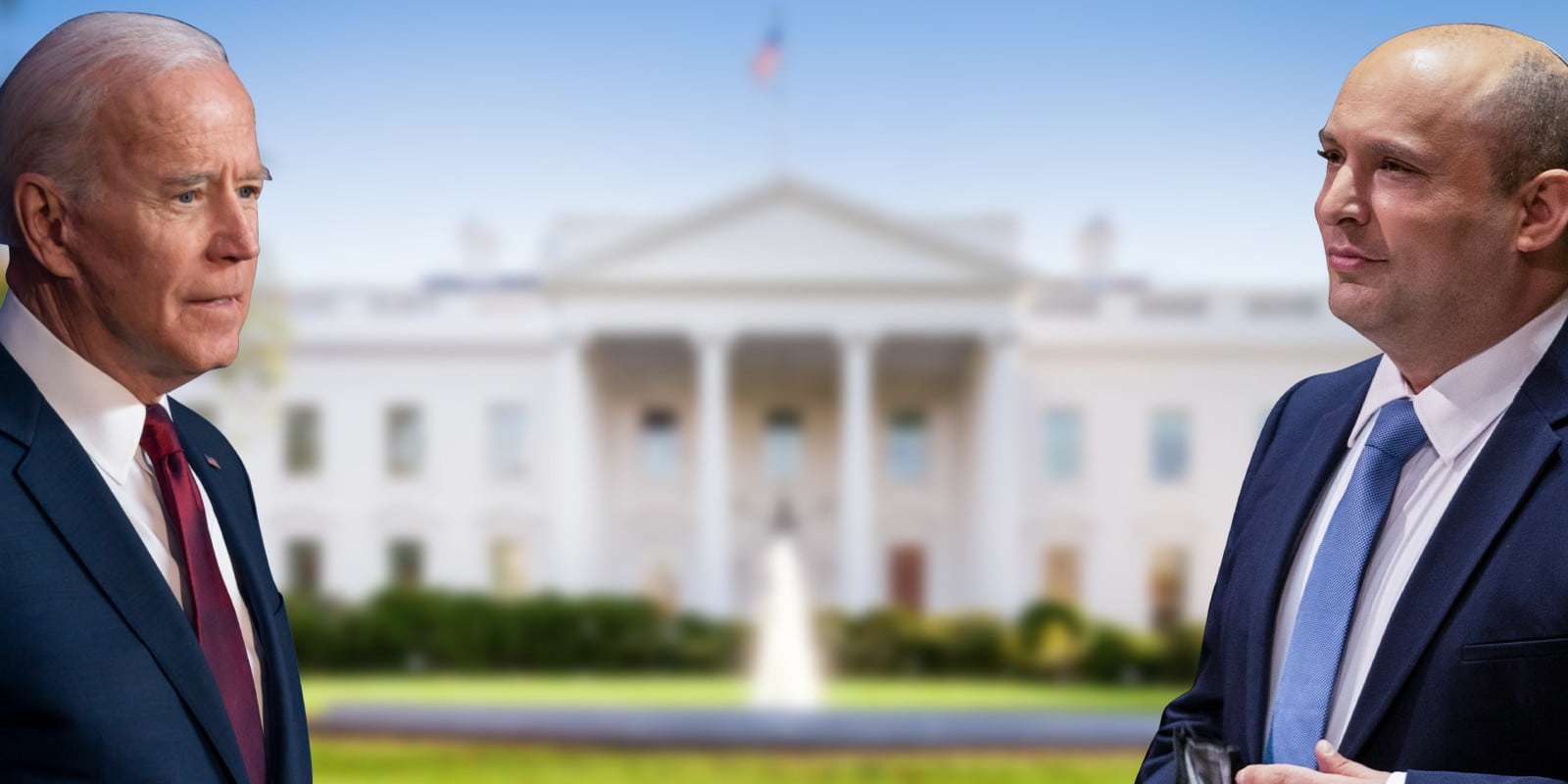Despite former prime minister Benjamin Netanyahu’s claim to a 40-year friendship with President Joe Biden, the latter preferred the new government headed by Prime Minister Naftali Bennett.
From the outset, it was clear that US President Joe Biden’s relationship with Israel would not be as close as those during former president Donald Trump’s presidency, but not as bad as they were during the Barak Obama era.
Israel has been concerned with several issues: Biden’s foreign policy and national security staff, who all served in key positions during the Obama administration; the isolationist tendency and the desire to leave the Middle East, which Obama adopted and Trump continued; the toxic relations that developed between former Prime Minister Benjamin Netanyahu and parts of the Democratic Party and American Jewry; and the strengthening of the progressive wing among Democrats, whose members are hostile to Israel and several are openly anti-Semitic.
During the first few months of Biden’s administration, Netanyahu was still prime minister. Then, in the middle of the year, a new national unity government was formed that removed Netanyahu from power and had representatives from the right, left, and center.
Despite Netanyahu’s claim to a 40-year friendship with Biden, the latter preferred the new government headed by Prime Minister Naftali Bennett. The Biden administration did not help establish it but thought it would cooperate more than its predecessor and be more attentive to US interests.
In August 2021, Bennett made his first visit to the White House, meeting with senior administration officials, the head of AIPAC, members of the pro-Israel lobby in Congress, and Jewish leaders. He promised to restore damaged relations.
Cabinet Secretaries in the Biden administration and the new Israeli cabinet ministers have frequently met and exchanged views. The most interesting channel was opened in the field of security between Secretary of Defense Lloyd Austin and Israeli Defense Minister Benny Gantz. Both are retired generals and speak the same military language.
Ganzt’s goals have been to inject security considerations into the American decision-making process, especially on the Iran nuclear program. This is to ensure the supply of advanced weapons and armaments to Israel, continued joint military maneuvers, and cultivate the military and security sections of the Abraham Accords.
The security and military ties have always been good, even during political and diplomatic disagreements. For example, in 2016, Obama and Netanyahu signed a 10-year military aid agreement totaling $3.8 billion a year. Yet, Congress had to approve this budget allocation annually.
The Democratic progressives pressed Biden to condition the aid on Israel’s policies toward the Palestinians. Biden ignored them. But when he promised to replenish the Iron Dome interceptors, which dwindled considerably because of Operation Guardian of the Walls in 2021, the progressives objected and forced Biden to drop the relevant item from his proposed federal budget. The issue has not yet been resolved.
The Iranian Nuclear Program
The most difficult challenge has been and still is the Iranian nuclear program. Biden and his senior officials have repeatedly declared that the US will not allow Iran to develop nuclear weapons but that diplomacy is the preferred way forward. If it fails, the administration has “other ways” to deal with the problem.
This vague phrase replaced the one Obama frequently used: “all options are on the table.” Ostensibly, this included a military operation, but Iran’s rulers, then like today, don’t believe it is a realistic option. A credible military threat is the only way to stop Iran’s race to the bomb.
The US position began with high expectations and deteriorated since and has led nowhere. The US sought a new nuclear deal that would be broader, stronger, and longer than Obama’s signed in 2015. A new agreement is supposed to effectively deal with Iran’s violations of the 2015 agreement and issues left out from the original deal, such as Iran’s missile program and military interventions throughout the Middle East.
The new deal idea may have been just an opening position. Still, soon after indirect negotiations opened in Vienna between the two sides, Iran announced that it would not discuss any new issue. Instead, it demanded that all sanctions be lifted first. The administration had already announced that a return to the 2015 agreement would be acceptable. Now, the US is talking only about an interim arrangement of “less for less.”
Bennett and Foreign Minister Yair Lapid adopted a different strategy toward the US than Netanyahu, who launched a significant frontal attack on Obama’s negotiations and his agreement. In contrast, Bennett and Lapid decided to refrain from public criticism and said that not every deal would necessarily be harmful. Instead, they tried to influence the Americans quietly behind closed doors.
Israel advised Biden not to lift any sanctions before reaching an agreement, set a deadline for reaching an agreement, develop alternatives in case diplomacy fails, and consider significant compensation for Israel with weapons and sophisticated munitions if an inadequate agreement is reached.
Israel feared Iran would use the negotiations to buy time and move forward with their nuclear program. The results of this strategy and the talks in Vienna are not yet known, but world powers may eventually achieve an interim agreement that could severely challenge Israel.
Palestinians
Members of Biden’s campaign sharply criticized Trump for his treatment of the Palestinians and his peace plan. It was clear that they would reverse the policies but not necessarily return to Obama’s obsessive peace initiatives.
Biden restored financial aid to the Palestinian Authority (PA) and the United Nations Relief and Works Agency (UNRWA), worth about 800 million dollars annually that Trump stopped. He missed, however, the opportunity to demand transparency and detailed accounting of expenses and violated the 2018 US Taylor Force Act, which prohibited the transfer of funds to the PA until it stopped paying salaries to the families of killed terrorists and prisoners convicted of terrorist acts. In addition, the transfer of funds to UNRWA was conditioned on removing incitement to violence in Palestinian textbooks. Still, this action has not been carried out.
Biden stated that he would not return the US Embassy from Jerusalem to Tel Aviv but is trying to nullify the political importance of the transfer. While announcing the transfer, Trump also recognized Jerusalem as Israel’s capital.
The Biden administration demands that Israel open a US consulate in Jerusalem for the Palestinians. However, this is not a consular issue since the embassy already has a consular section for Jews and Arabs.
Israel also proposed that the US establish a consulate for Palestinians in Ramallah, where the Palestinian government and parliament are located, or even Abu Dis, a village near Jerusalem.
The US does not have both an embassy and a consulate anywhere in the world. Hence, the demand to open the consulate in Jerusalem is political and intended to dwarf the embassy’s status and signal that the US does not recognize Jerusalem as the capital of Israel.
The Bennett-Lapid government vehemently opposed Biden’s pressure and told him that opening the consulate could lead to the government’s downfall and the imminent return of Netanyahu to power. However, the fragile coalition helped the government postpone the crisis in this case.
The Biden administration has opposed the expansion of Israeli settlements in the West Bank and around Jerusalem. Recently, it criticized the plan to build new neighborhoods in Jerusalem, in the South, at the Givat Hamatos area, and in the North, at the old airport in Atarot. But, on the other hand, the Biden administration and Israel agreed to weaken Hamas in Gaza and strengthen the PA in the West Bank.
Yet, Biden nearly achieved the opposite result. He pressured Palestinian leader Mahmoud Abbas to hold elections. The last time such elections were held was in 2006, which came after pressure from former president George W. Bush.
The Biden administration thought elections in 2021 would legitimize Abbas’s corrupt and ineffective rule. Biden learned nothing from the 2006 election failure that yielded a victory for Hamas in Gaza. But Abbas agreed to hold elections for the Legislative Council on May 22, 2021, and president on July 31.
However, Abbas canceled them when it became clear that Hamas would be the victor. Nevertheless, Biden supported several of Gantz’s moves, including granting work permits in Israel to thousands of Gazans, his meetings with King Abdullah of Jordan and Abbas, and his willingness to provide financial assistance to the PA.
Human Rights
Trump harshly criticized the UN and its corrupt and politically biased institutions, notably the UN Human Rights Council (UNHRC) and the International Criminal Court in The Hague (ICC). He removed the US from the UNHRC and imposed personal sanctions on ICC’s prosecutor Fatou Bensouda, who wanted to investigate the US and Israel for “war crimes.”
Close collaboration with the UN and the protection of human rights are always placed high on the foreign policy priorities of Democratic administrations. Recently, they have become even more significant due to pressure from the progressive Democrats.
The Biden administration has condemned human rights violations in China, Russia, and Saudi Arabia. Iran is one of the world’s worst human rights violators, but the Biden administration has ignored it because of its eagerness to reach a nuclear deal. In addition, Hamas and the PA are wholesale human rights violators.
The Biden administration was quick to publish a report in February 2021 accusing Saudi Crown Prince Mohammed bin Salman of direct involvement in the murder of Saudi journalist Jamal Khashoggi in Turkey in October 2018. But Biden was silent on a similar Palestinian case.
Nizar Banat, head of the Freedom and Dignity List, was a prominent Palestinian human rights activist strongly opposing and criticizing the policies and corruption of the PA. On June 24, 2021, the PA arrested him, and a short time later, he was found dead in his cell. His death sparked numerous riots in the West Bank, and his supporters claimed the PA had executed him. Eager to appease the Palestinians, the Biden administration ignored the affair.
Biden reversed Trump’s policies toward the UN and its institutions. Instead, he advocated close cooperation with the UN, returned the US to the UNHRC, and lifted sanctions against the ICC. Secretary of State Antony Blinken explained that the US should act from within to change the conduct of UN institutions.
Interestingly, the lifting of sanctions on the ICC paid off because the new prosecutor announced he would not open an investigation against the US. Perhaps Blinken reached an understanding with the ICC in return for lifting the sanctions. Still, that move left Israel vulnerable to systematic harassment and bias of both the UNHRC and the ICC.
Conclusion
Obama and Trump had contrasting policies regarding Israel. In Biden’s first year in office, after 12 consecutive years of Netanyahu’s rule, the government changed in Israel.
The two new administrations created opportunities for new types of collaboration.
A bad Iran nuclear deal and a lack of adequate compensation for Israel could create severe tensions. Further, US indifference to the Abraham Accords could endanger the regional alignment against Iran.
US pressure on the Palestinian file could dismantle the government, and the Americans may be reluctant to follow this path not to cause the government to fall.
Israel should prepare for any scenario in its relations with the US, particularly regarding any fallout if a deal is reached with Iran.
JISS Policy Papers are published through the generosity of the Greg Rosshandler Family.
Photos: Shutterstock, Freepik









 - בניית אתרים
- בניית אתרים